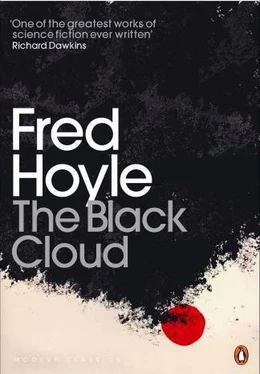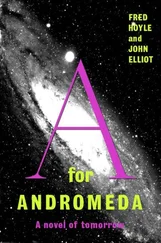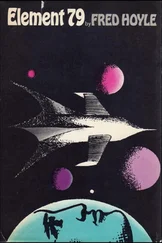Fred Hoyle - The Black Cloud
Здесь есть возможность читать онлайн «Fred Hoyle - The Black Cloud» весь текст электронной книги совершенно бесплатно (целиком полную версию без сокращений). В некоторых случаях можно слушать аудио, скачать через торрент в формате fb2 и присутствует краткое содержание. Жанр: Фантастика и фэнтези, на английском языке. Описание произведения, (предисловие) а так же отзывы посетителей доступны на портале библиотеки ЛибКат.
- Название:The Black Cloud
- Автор:
- Жанр:
- Год:неизвестен
- ISBN:нет данных
- Рейтинг книги:5 / 5. Голосов: 1
-
Избранное:Добавить в избранное
- Отзывы:
-
Ваша оценка:
- 100
- 1
- 2
- 3
- 4
- 5
The Black Cloud: краткое содержание, описание и аннотация
Предлагаем к чтению аннотацию, описание, краткое содержание или предисловие (зависит от того, что написал сам автор книги «The Black Cloud»). Если вы не нашли необходимую информацию о книге — напишите в комментариях, мы постараемся отыскать её.
The Black Cloud — читать онлайн бесплатно полную книгу (весь текст) целиком
Ниже представлен текст книги, разбитый по страницам. Система сохранения места последней прочитанной страницы, позволяет с удобством читать онлайн бесплатно книгу «The Black Cloud», без необходимости каждый раз заново искать на чём Вы остановились. Поставьте закладку, и сможете в любой момент перейти на страницу, на которой закончили чтение.
Интервал:
Закладка:
“Well, what’s the matter with that? It’ll be nice and easy to read.”
“Yes, that’s all right so far as it goes. But remember that we can only read about a hundred and twenty words a minute, whereas we’re hoping to transmit at least a hundred times faster than that.”
“We shall have to tell Johnny Boy up there to slow down the speed of his replies, that’s all. We’ll tell him that we’re such dimwits that we can only deal with a hundred and twenty words a minute, instead of the tens of thousands that he seems capable of gobbling up.”
“All very good, Harry, I’m not quarrelling with anything you say.”
“Only you’re wanting me to do more work, eh?”
“That’s right. How did you guess? My idea is that it’d be nice to hear the Cloud’s messages acoustically, as well as to read ’em off a tube. We’ll get much more tired reading than listening.”
“To quote Alexis, I think it’s a bloody awful idea. You realize what it involves?”
“It means you’ll have to keep sight and sound equivalents. We could use the electronic computer for that. We’ve only got to store about five thousand words.”
“Only!”
“I don’t see it’s going to mean very much work at all. We shall have to go over individual words quite slowly to the Cloud. I’m reckoning about a week for it. As we show off each word we put some key part of our T.V. signal on to punched tape. That shouldn’t be difficult. You can also put the sound of the words on to punched tape, using a microphone, of course, to get the sound into an electrical form. Once we’ve got it all on tape we can put it into the computer any time we like. There’ll be quite a lot of storage needed so we’ll use the magnetics. It’ll be easily fast enough. And we’ll put a conversion programme in the high-speed store. Then we can either read the Cloud’s messages on a television tube or hear ’em over a loud-speaker.”
“I’ll say this for you, Chris. I never knew anyone who was better at finding work for other people. I take it that you’ll write the conversion programme.”
“Of course.”
“A nice armchair job, eh? Meanwhile us poor devils can slave away with our soldering irons, burning holes in our trousers and heaven knows what. What voice shall I use for the sound?”
“Your own, Harry. That’s your reward for having all those holes burned in your trousers. We shall all be listening to you for hours on end!”
As time went on, the idea of a conversion of the Cloud’s messages into sound seemed to commend itself more and more to Harry Leicester. After a few days he began to go around with a more or less permanent grin on his face, but nobody could discover the joke.
The television system turned out highly successful. After four days of transmission a message was received that read:
“Congratulations on improvement of technique.”
This message appeared on the television tube since the sound-conversion system was not yet working.
The transmission of individual words proved rather more difficult than had been expected, but eventually it was accomplished. The transmission of scientific and mathematical works turned out a simple matter. Indeed it soon became clear that these transmissions were only serving to acquaint the Cloud with the state of human development, rather as a child shows off its attainments to an adult. Books dealing with social issues were then run through. Their choice was a matter of some difficulty and in the end a large and rather random sample was televised. It became clear that the Cloud was having more difficulty in absorbing this material. At length the message came, still read on the television tube:
“Later transmissions appear most confused and strange. I have many questions to ask, but would prefer to deal with them at some future time. Incidentally your transmissions are interfering very seriously, on account of the proximity of your transmitter, with various external messages that I wish to receive. For this reason I am providing you with the following code. In future always use this code. I intend setting up an electronic shield against your transmitter. The code will serve as a signal that you wish to penetrate the shield. If it is convenient you will be allowed to do so. You may expect to receive a further transmission from me in approximately forty-eight hours from now.”
An intricate pattern of lights flashed across the television tube. They were followed by a further message:
“Please confirm that you have received this code and can use it.”
Leicester dictated the following reply:
“We have made a recording of your code. We believe that we can use it but are not certain. We will confirm at your next transmission.”
There was a delay of about ten minutes. Then the reply came:
“Very well. Good-bye.”
Kingsley explained to Ann Halsey:
“The delay is due to the time required for the transmission to reach the Cloud and for the reply to get back here. These delays are going to make short speeches rather unprofitable.”
But Ann Halsey was less interested in the delays than in the tone of the Cloud’s messages.
“It sounded just like a human,” she said, wide-eyed with amazement.
“Of course it did. How could it have done otherwise? It’s using our language and our phrases, so it’s bound to sound human.”
“But the “good-bye” sounded so nice.”
“Nonsense! To the Cloud “good-bye” is probably just a code word for ending a transmission. Remember that it’s learned our language from scratch in about a fortnight. That doesn’t look very human to me.”
“Oh, Chris, you’re exactly what the Americans call a “sad sack”. Isn’t he, Geoff?”
“What, Chris a sad sack? I should just say he is, ma’am, the biggest god-almighty sad sack in Christendom. Yes, sir! Seriously, Chris, what did you think of it?”
“I thought the sending of a code was a very good sign.”
“So did I. Very good for our morale. Heaven knows we need it. This last year hasn’t been easy. I think I feel better than I’ve felt since the day I picked you up at Los Angeles airport, and that seems at least a lifetime ago.”
Ann Halsey wrinkled her nose.
“I can’t understand why you go all goofy over a code, and why you poured cold water on my “good-bye”.”
“Because, my dear,” answered Kingsley, “the sending of the code was a reasonable rational thing to do. It was a point of contact, of understanding, quite unconnected with language, whereas the “good-bye” was only a superficial linguistic gloss.”
Leicester walked across to join them.
“This two-day delay is rather fortunate. I think we can get the sound system working by then.”
“How about the code?”
“I’m pretty sure it’s all right, but I thought it’d be best to be on the safe side.”
Two days later in the evening the whole company assembled in the transmitting lab. Leicester and his friends busied themselves with last-minute adjustments. It was nearly eight o’clock when preliminary flashes appeared on the tube. Words soon began to appear.
“Let’s have some sound,” said Leicester.
There were broad grins and laughter as a voice came over the loud-speaker, for it was the voice of Joe Stoddard that spoke. For a minute or so most people thought of a hoax, but then it was noticed that the voice and the words on the tube were the same. And decidedly the sentiments were not those of Joe Stoddard.
Leicester’s joke had some advantage. Of necessity he had not been given sufficient time to include voice inflexions: each word was always pronounced the same way, and the words were always spoken at the same rate, except at the end of sentences where there was always a slight pause. These disadvantages of the sound reproduction were to some extent compensated by the fact that in natural speech Joe Stoddard did not show much inflexion anyway. And Leicester had cleverly timed the rate of delivery of the words to agree pretty closely with Joe’s natural speech. So although the Cloud’s speech was obviously an artificial imitation of Joe, the imitation was quite a good one. Nobody ever really got used to the Cloud speaking with the easy slow burr of the West Country, and nobody ever quite got over the indescribably comic effect of some of Joe’s mispronunciations. Ever afterwards the Cloud was known as Joe.
Читать дальшеИнтервал:
Закладка:
Похожие книги на «The Black Cloud»
Представляем Вашему вниманию похожие книги на «The Black Cloud» списком для выбора. Мы отобрали схожую по названию и смыслу литературу в надежде предоставить читателям больше вариантов отыскать новые, интересные, ещё непрочитанные произведения.
Обсуждение, отзывы о книге «The Black Cloud» и просто собственные мнения читателей. Оставьте ваши комментарии, напишите, что Вы думаете о произведении, его смысле или главных героях. Укажите что конкретно понравилось, а что нет, и почему Вы так считаете.












